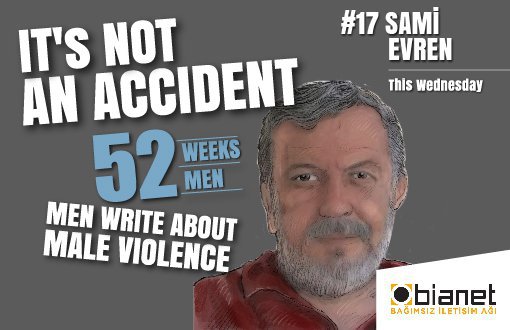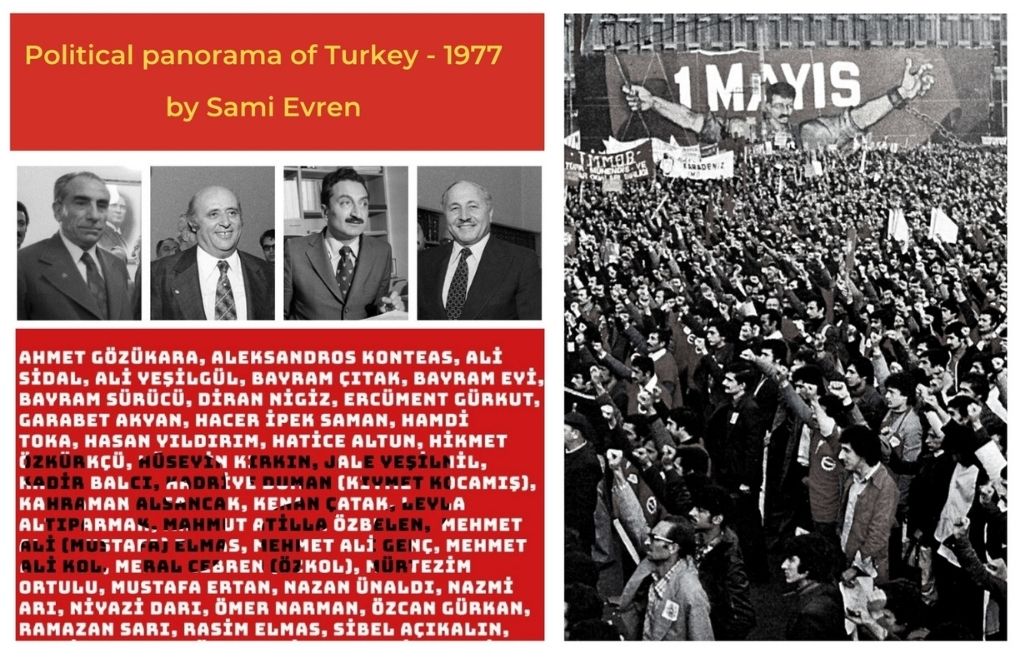Click to read the article in Turkish / Kurdish
I would like to emphasize why it is very important for men to start talking about past experiences by questioning "manhood and the violence generated by men" and how this scares me.
Yes, the fact that my thoughts on this subject as a man are accompanied by a number of fears indicates that this article series is even more important than I thought.
In fact, even writing a piece about this subject necessitates me to say and do things beyond talking about and condemning femicides, and to seek what I've actually been running from.
I think, trying to talk about masculinity in all its layers requires the courage to deal with the fear of getting naked. It is going to be a bit like many of us saying "At the end of the day, I too am a man living in this society", but it is a start after all.
What is my responsibility in a social network in which all sorts of systematic violence and harassment committed against women in every private and public space is considered normal? How significant is it that I am not a direct subject of this issue?
Venomous looks of the imam
I started primary school in the village of Sinci, Karaman in 1965. I was seven years old when I found myself in the training and seating order of one class, one teacher, first graders in the front row, fifth graders in the back, and the rest in between.
We would all stand in front of the flagpole as students in white collars, black aprons, wool socks, rubber shoes and girls with white ribbons, and we would not move a muscle once İrfan teacher gave the attention command.
When the weekend holiday began on Saturday afternoon, we would run to our self-made toys that we hid in a nook behind the barn of Sarıların Halil.
We were going to the hodja on Sundays. The children who knew how to read the whole Koran were highly praised in the village.
One day, the imam of the village appeared behind the barn where we were playing. He directly headed towards Asiye and lifted her holding her arm, goggled his eyes and hurled her forward. "You will never again play with men or leave the house", he shouted.
The only thing left behind was the broken wheel that Asiye was trying to make with the head of a sunflower.
Girls and boys...
Asiye never joined our game again. I was very scared and felt myself guilty. Ahmet looked very pleased with how his father treated his sister. "I'd told her", he said.
Thanks to the most respected, wisest hodja of the village, I'd learned that girls cannot play with boys. I never forgot the venomous looks of the imam.
Years passed by quickly and we moved to the city. Now I was a student of Gazi Mustafa Kemal Primary School again with one class, one teacher. I could see my friends from the village only during harvest season in summer.
I was missing them; especially Ayşegül, whom I kept teasing and fighting with. My main way of communication with her was hit-and-run. Of course, I never told this to anybody.
In the following years, I heard that Zeliha and Hüseyin got married. Hüseyin was a scrawny, silent boy. You know how they say, if you snatched away his bread he still wouldn't say a word, he was that kind of a boy. I don't remember Zeliha's youth days.
Headlines: Honor Killing
The horrible news of murder spread fast in the village: Hüseyin had murdered his wife. The next day my dad had brought home all the newspapers that covered the incident. The headlines read, "Honor Killing".
This incident that curdled our blood was spoken about for days. People said that Zeliha's family didn't want her body. I was there when people gathered in front of the courthouse for the first hearing.
Hüseyin was brought to court in handcuffs by the gendarmerie. The gendarmes were scanning around them with stern looks, their shoulders straight, chests pushed out, probably because they were accompanying an important figure.
The scrawny, feeble Hüseyin was invigorated, his walk had changed, it was like he was not the one who committed the murder, killed a person. It was like he had become a "man" for the second time, the first time being the circumcision.
Our people are very sensitive, the crowds gathered and sent him to the courtroom amidst applause.
The hero who restored his honor received a very small sentence due to unjust provocation and he was released.
With the killing of my childhood friend, and surrounded by grey painted cold walls, I now had a better grasp of the concept of honor. Gendarmerie, court, judge, people, state, justice, this murder had it all.
Result: Hüseyin is a "victim of fate", Zeliha a "whore", and millions of Hüseyins are now "guardians of honor".
I used to believe that we could solve it with socialism
In high school years, I had already started to prove myself as a typical leftist man who was shaped by both the influence of the political climate and the social fabric I lived in.
I had dived into subjects like communal society, primitive society, feudalism, capitalism... Eager to learn what socialism was, I never missed the seminars at the People's Houses. I had now met with Marxist ideas and come quite a ways in becoming a socialist and revolutionist.
I never refrained from being on the front lines of the fight when the anti-fascist struggle was on the rise. Because it was a time when our ears were filled with slogans like "Revolution martyrs are immortal".
March 8
I had believed in the revolution so much... It was in that period that we read the history of March 8 International Working Women's Day together with our "sisters". Even though at home we continued to enjoy my mother and my sister Sema's infinite services with my father and brother, I had understood that men and women should be equal.
Even though I wasn't seeing what their husbands and brothers did to them, I'd learned about the injustices done to laborer women by their bosses.
I was believing that we would solve all these problems with socialism after the revolution, but then the September 12 coup happened. And after that, the Soviet Union collapsed.
Trying not to say "Like a man"...
After being released from prison, I started to work as a teacher again in 1984 in İstanbul. It must be due to the effect of the 1989 Spring Demonstrations that I found myself in the struggle.
I began to actively partake in the activities of, first, the Association of Working Educators (Eğit-Der) and then the Union of Educators (Eğit-Sen).
Thanks to the awareness created by the feminist activists in the union, I understood that the females should be called women, that the women who are not workers also have their problems, and that the March 8 International Women's Day has a central importance for the women's struggle.
Even today, (though it still escapes my lips involuntarily) I pay attention to my language and do my best not to say "like a man". [In Turkish, doing something "like a man" means doing it properly.]
Even though I try to summarize the situation in this way, the reality of life is, of course, not exactly like that.
When engaging in small talk with my male friends, I continue uttering all types of swear words and having sexually explicit conversations. I pay attention to my language only in the company of women; and all the while I myself know what is lurking inside me.
Conservatism
It is the success of the struggle waged by women that not only positive discrimination and quota practices, but also new institutional arrangements such as co-chairpersonship and co-spokespersonship have been introduced so that women can be elected to administrative positions in democratic mass organizations and civil organizations.
Although I view it as a positive development that there is a will to achieve gender equality, albeit relatively, I think I have learned that the point in question is not that simple.
I have frequently experienced in my personal life that the issue of conservatism does not solely concern those groups with a traditional culture, but also the ones who maintain that they are egalitarian, libertarian human rights defenders who are against discrimination.
I have started to think that doing politics by intellectually depreciating the subjects of gender, gender difference, oppression, violence, domination, etc. and excluding them from the sphere of politics reproduces the system over and over again.
Patriarchy and capitalism
For this reason, I have reached the conclusion that the struggle against capitalism and the cultural fascism it produces is a problem of also the men who do not engage or intervene in incidents that seem to be exceptions.
It would be easier for us men if gender inequality and oppression were not addressed as singular or exceptional cases but as phenomena arising in interpersonal relations.
However, on the contrary, what has been happening is on such a scale that it affects the whole society and cannot be explained by remaining on the personal level. It is reproduced in the essence of the system. If I start to perceive the relationship between patriarchy and capitalism, then, even in this chaos, I can wipe clean the slate of my consciousness as a man.
I think that the women's struggle is the most qualified movement among the organizations of public laborers. This is what I think despite several adversities.
Harassment, mobbing
In social struggles, the unions and organizations fighting for democracy, which defend the rights of labor, nature, humans, LGBTI individuals and oppose war and militarism, are struggling against the problems created by the system.
However, when it comes to what the women in their own organizations experience or the incidents they face, the inconsistencies of the men inside the same organization stick out like a sore thumb.
They invent a number of excuses to cover up the mobbing practices and harassment cases within their organizations, to deal with these incidents among themselves, and most of the time, to whitewash harassment on the grounds that their organization will be exposed.
Intra-organizational law
In fact, the point is very simple. If a woman employee claims that she has been subjected to harassment, what needs to be done is to enforce the intra-organizational law based on the statement of the woman. And to take precautions to ensure that the woman is not affected in the workplace; these are the things that have to be done in a democratic organization at the first stage.
However, this is not what happens, the intra-organizational power mobilizes, hinders the investigation and the high politics reveals its hidden male face in a number of ways including threats, blackmails and the reorganization of intra-organizational politics.
Witnessing how such an organization turns into a small "state apparatus" in the face of such incidents as harassment / mobbing that are experienced by people among its own ranks and seeing the frightening dimension of the subject has been an important experience for me...
In the face of this experience I resigned from my post, which some interpreted as taking an "honorable" stand, yet others thought was "about a woman". But the truly important question is this: What happened to the woman who was subjected to harassment / mobbing?
Conclusion
In a study she conducted on convicted rapists, Diana Scully has reached the conclusion that sexual violence is a widespread problem rooted in the patriarchal culture.
In short, we need to change ourselves so that sexual violence can come to an end. Yes, it is really "not a coincidence" that women do not kill men. Men kill women. (SE/ŞA/APA/SD/TK/IG)
* Images: Kemal Gökhan Gürses
CLICK TO READ ALL "52 MEN 52 WEEKS" ARTICLES
|







_(1).jpg)